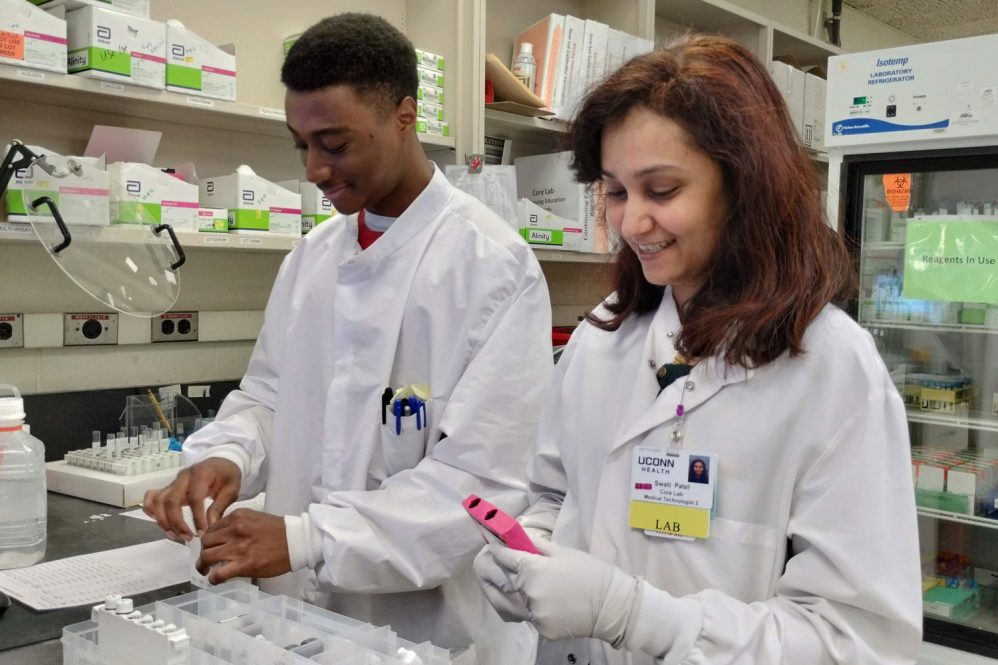Often referred to simply as “the lab,” UConn Health’s Department of Pathology and Laboratory Medicine has a workforce of more than 115, many in areas that work around the clock.
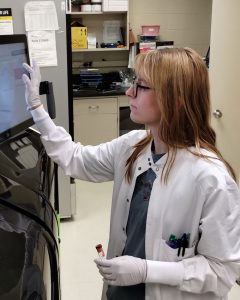
In advance of Medical Laboratory Professionals Week, April 23-29, the accolades come from throughout the institution.
“Thank you to all of our medical lab staff, who work so hard every day to ensure quality care in the patients we serve,” says Caryl Ryan, chief nursing officer and UConn John Dempsey Hospital chief operating officer. “These professionals are respected front-line staff who interact with many patients daily and are truly valuable members of the interdisciplinary team.”
“UConn Health is a team, and with that one of the key components in providing exceptional care is our group in the lab,” says Anne Horbatuck, vice president of ambulatory services and UConn Medical Group chief operating officer. “We work with them closely in our multiple locations and appreciate all that they do. So during Medical Lab Professionals Week we would like to thank them for being a part of our UConn Health Team.”
The Anatomic Pathology Division includes histology, cytology, and surgical pathology, while the Lab Medicine Division includes core laboratory (hematology and coagulation), microbiology, blood bank, phlebotomy, special chemistry, special coagulation, cancer center laboratory and anticoagulation clinic, decentralized laboratory testing, and point-of-care testing.
We are so fortunate to have the support of the amazing pathologists, medical technologists, and other laboratory professionals who are often ‘behind the scenes’ in our patient care. — Andrea Moran
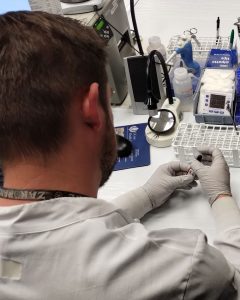
“The lab plays such an integral role in the care of our patients in the emergency department,” says Dr. Alise Frallicciardi, medical director of emergency medicine. “Patients are coming in with life-threatening emergencies and fast, accurate labs help us save lives. The lab team works hard to make sure our clinicians have the information they need day in and out to help patients get back to their lives. We could not do our job without them!”
Forced into pandemic mode more than three years ago, the lab since has developed a laboratory for COVID-19 testing, expanded services, worked with departments throughout the institution to accommodate evolving needs, and expanded blood draw services.
“Lab advancements are made every year in technology, as well as the sampling of specimens,” says Jessica Underwood, senior director who oversees the lab. “There have been several advances made in specific testing on specimens collected and the management of patient treatment plans, especially in the genetics arena. As more markers and genes are identified, testing has expanded, as well as targeted treatment. For regulatory and safety reasons, the lab is always evolving depending on new regulations and safety initiatives.”
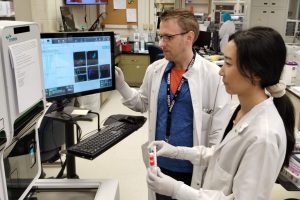
All lab employees work on-site, with the core lab and blood bank working around the clock, and microbiology working first and second shift, seven days a week.
“The central lab area and microbiology staff are always friendly and quick to process our lab work,” says Patty Fagan, assistant nurse manager in the cardiac catheterization lab. “I want to recognize Giuseppa Mancuso from point-of-care testing. Giuseppa is always friendly and willing to help at a moment’s notice. UConn should appreciate what a valued employee she is.”
Underwood says her staff takes a collective approach to meeting the lab’s many demands.
“The main demand, and expectation, is to provide exceptional service, results in a timely fashion — especially if they are considered stat testing — and teamwork,” Underwood says. “This isn’t just teamwork within the laboratory; it expands to supporting our nursing teams with training and inpatient phlebotomy, providing support for clinics that have decentralized and point-of-care laboratory testing processes, collaborating with departments to introduce a new test into our specimen collection menu, and working collaboratively with our couriers and facilities teams.”
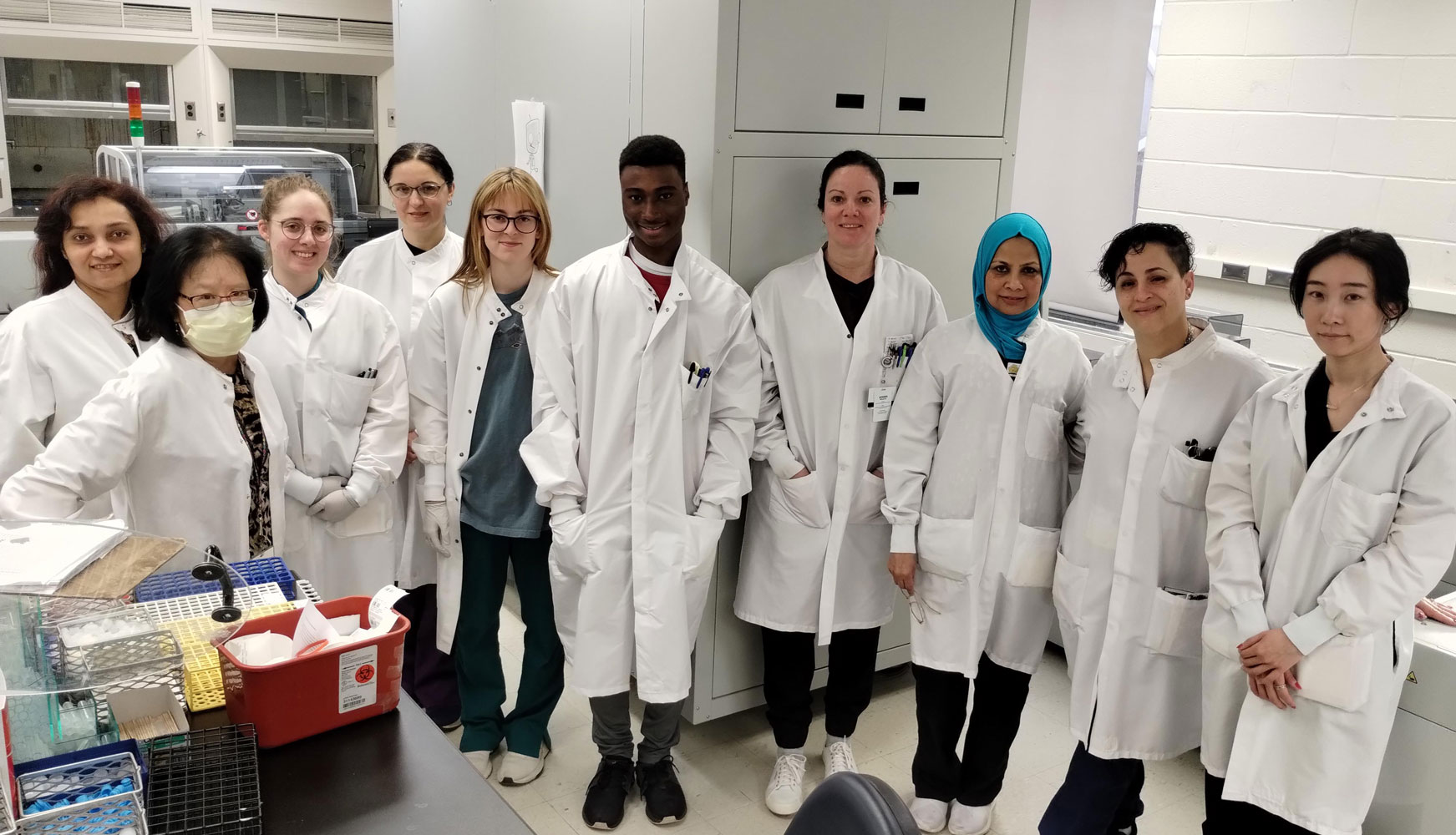
In the Carole and Ray Neag Comprehensive Cancer Center, lead hematology oncology nurse practitioner Andrea Moran says nearly every aspect of patient care involves lab personnel.
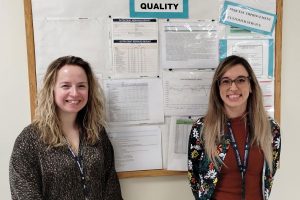
“We are so fortunate to have the support of the amazing pathologists, medical technologists, and other laboratory professionals who are often ‘behind the scenes’ in our patient care,” Moran says. “We call on our colleagues in the lab at all hours of the day and night to perform phlebotomy on our most fragile patients, run specialized diagnostic tests, assist with interpreting lab results on complicated patient conditions, and prepare and deliver lifesaving blood products. Thank you all for your hard work and support every day. We couldn’t do our jobs without you!”
Carolyn Krivca, assistant nurse manager on the orthopedic surgery floor, is especially grateful for the phlebotomists, two in particular: Jasmine Springer and Justin Krajcik,
“Our unit raves about how kind and helpful they always are despite challenges shifts may throw their way,” Krivca says. “They are always professional and kind with staff and patients. Between their patience and bedside manner, to them going above and beyond for patients who may be difficult sticks, to helping out during rapid response calls or codes, they always seem to be right there when you need them, at ease and ready to help. We truly appreciate all their hard work and kindness!”
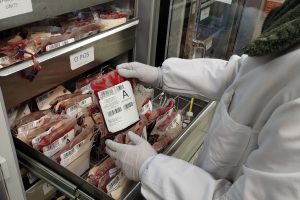
Jeff Boyko, director of logistics management, can relate to the impact the pandemic can have on health care delivery and all that’s necessary to carry it out, as his group, like the lab, were among those who answered the call largely behind the scenes.
“I am very grateful for the collegial and professional relationship we share with the lab staff,” Boyko says. “During the supply chain shortages, the lab staff worked with us hand in glove to preserve stock and seek alternative solutions for extreme shortages. This open communication continues today.”
And he shares the appreciation of the phlebotomists.
“From a personal perspective, I am arguably the world’s biggest chicken when it comes to blood draws,” he says. “The phlebotomists are fabulous. I have never had a bad needle stick.”
